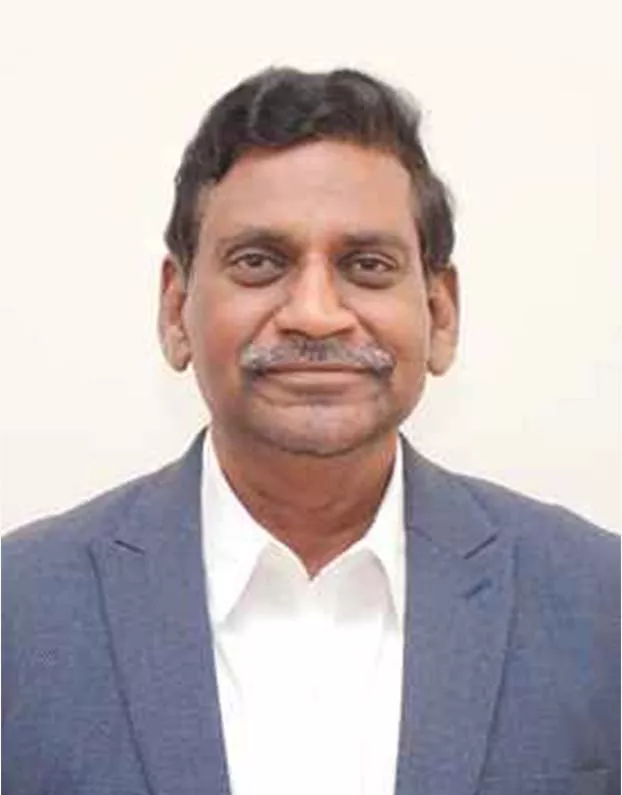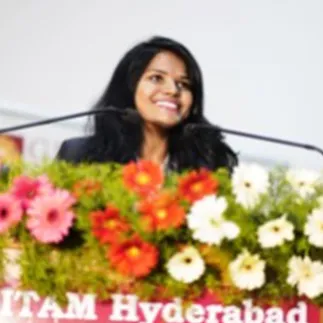Master of Business Administration
With a legacy as a pioneer in specialised MBA programmes, including FinTech and Foreign Trade (International Business), GITAM School of Business offers a programme designed to cultivate future business leaders. Our Hyderabad campus MBA equips students with the strategic thinking, managerial acumen, and practical skills essential for success.
Taught by industry-experienced faculty, the programme fosters a dynamic learning environment that prepares graduates for leadership roles across various industries. Strong industry connections provide opportunities for networking and exposure to the latest business trends.

Eligibility
A minimum of 60% or 6.0 CGPA aggregate marks in any bachelors degree from a recognized Central / State University or its equivalent and present a valid score in one of the recognized qualifying exams, including GITAM Business Aptitude Test (GBAT), CAT, MAT, NMAT, CMAT, SNAP, or AP/TG ICET.
Scope of the Programme
A Master of Business Administration (MBA) is a postgraduate degree designed to equip individuals with the strategic thinking, leadership, and managerial skills essential for success in the business world. The programme provides a comprehensive understanding of core business functions, including finance, marketing, accounting, operations, and human resources.
Through a curriculum rich in case studies, group projects, and internships, students gain hands-on experience and apply theoretical knowledge to real-world challenges. An MBA opens doors to a wide range of career opportunities, from management and consulting to entrepreneurship and finance.
Key Highlights
Faculty Composition
- Faculty with strong domain expertise
- Globally-renowned visiting faculty
- CXOs, business leaders, and policymakers
Infrastructure
- Theatre-style classrooms
- Bloomberg and NSE Labs
- Analytics Lab
- Bootcamp and collaboration spaces
Innovation
- Venture Development Centre
- Venture Education
- Incubation
- Access to funding and resources
Pedagogy
- Case study method and activity-based learning
- Interdisciplinary approach
- Entrepreneurial-focussed and technology-driven
- Collaborative projects
Research Exposure
- Centre for Business Growth
- Centre for Business Engagement
- Separate research track for internship and immersion
Syllabus
The modular MBA is a comprehensive programme structured across eight terms, offering seven specialised tracks. It integrates 50% Harvard Business School case studies to provide real-world insights.
Students benefit from five immersive and three internship tracks. With a strong focus on sustainability, technology, and entrepreneurship, the programme includes practical workshops to enhance skill development.
Specialisations
- Strategy and Consulting
- Business Analytics
- Accounting & Finance
- Marketing
- International Business
- Information Systems
- Organisation Development & Human Resource
- Operations & Supply Chain
- Entrepreneurship
Immersion Tracks
- International
- Industry
- Social
- Entrepreneurship
- Research
Internship Tracks
- Summer Internship
- Founder's Lab
- Research
Career Options
Graduates from this programme can explore a variety of career paths, including:
- Accounting and Finance
- Entrepreneurship
- Information Systems
- International Business (offered only at Visakhapatnam)
- Marketing
- Operations & Supply Chain
- Organisational Development & Human Resource
Department Vision Statement
- We aspire to shape generations of ethical and impactful leaders.
Department Mission Statement
- To enrich the academic learning experience by leveraging the dynamic ecosystem.
- To engage in research that enriches scholarship, which enhances policy and practice.
- To embark on sustainable initiatives aimed at making an inclusive societal impact.
Programme Outcomes (POs)
- PO1: Apply knowledge of management theories and practices to solve business problems.
- PO2: Foster analytical and critical thinking abilities for data-based decision-making.
- PO3: Ability to develop a value-based leadership approach.
- PO4: Ability to understand, analyze, and communicate global, economic, legal, and ethical aspects of business.
- PO5: Ability to lead themselves and others in the achievement of organizational goals, contributing effectively to a team environment.
Programme Specific Outcomes(PSOs)
- PSO1: Apply management theories for effective management of business.
- PSO2: Evaluate business opportunities in the marketplace using management techniques in order to attain a dominant position in the industry.
Programme Educational Objectives (PEOs)
- PEO 1: Are competent, creative, and highly valued professionals in industry, academia, or government.
- PEO 2: Are flexible and adaptable in the workplace, possess the capacity to embrace new opportunities of emerging technologies, and embrace leadership and teamwork opportunities, all affording sustainable management careers.
- PEO 3: Continue their professional development by obtaining advanced degrees in Management or other professional fields.
- PEO 4: Act with global, ethical, societal, ecological, and commercial awareness expected of practicing management professionals.
Class Profile
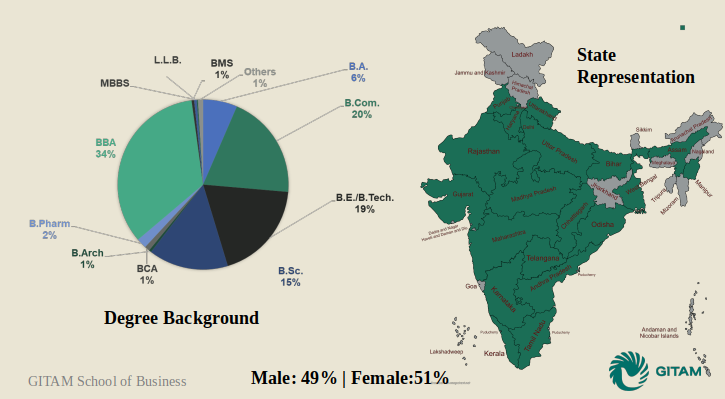
Career Guidance & Placement at GSB
One- on-one-Mentorship with Alumni/ Industry leaders
Excellent student to recruiter ratio 2:1
Upto 100% Internship opportunities facilitated
Training
- Soft skills
- Profile Building
- Aptitude
- GD, PI
150
Recruiters
392
Job Offers
310
Students Placed
91%
% of Placement
16.22
Highest Package PA in Lakhs
7.2
Average Package PA in Lakhs
Placements Data (2024,2023, 2022 & 2021)
Star Recruiters







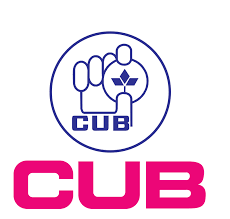
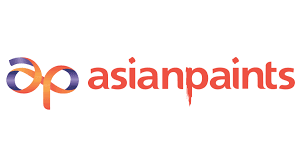
Curriculum
The term system ensures focused learning in shorter, intensive periods. It allows for deep engagement, practical application, and efficient time management, preparing students with precision and rigour for real-world challenges.
| Term - 1 | Term - 2 | ||
|---|---|---|---|
| Core | Cr | Core | Cr |
| Quantitative Techniques | 3 | Marketing Management - II | 2 |
| Micro Economics | 2 | Macro Economics | 2 |
| Organisational Behaviour | 3 | Human Resource Management | 3 |
| Quantitative Techniques | 3 | Marketing Management - II | 2 |
| Financial Reporting and Analysis | 3 | Management Accounting and Control | 3 |
| Marketing Management - I | 2 | Operations Management | 2 |
| Workshop - Business Communication | 1 | Workshop - Spreadsheet Modelling | 1 |
| Aug-Sep | 14 | Oct-Nov | 14 |
| Term - 3 | Term - 4 | ||
|---|---|---|---|
| Core | Cr | Core | Cr |
| Corporate Finance - I | 2 | Data Visualisation for DM | 3 |
| International Business | 3 | Business Research Methods | 3 |
| Business Analytics | 2 | Concentration I - Elective 1 | 3 |
| Innovation and Entrepreneurship | 2 | Concentration II - Elective 1 | 3 |
| Immersion* (Choice)# | 4 | Corporate Finance - II | 2 |
| Workshop - Critical Writing | 1 | Workshop - Effective Leadership | 1 |
| Dec-Feb | 14 | Mar-Apr | 15 |
* One month programme in Feb
| # Immersion (Choice) |
|---|
| International Immersion |
| Industry Immersion |
| Social Immersion |
| Entrepreneurship Immersion |
| Research Immersion |
| Independent Study | |
|---|---|
| SI/FL/RI (Choice) | Cr |
| Summer Internship | 9 |
| Founders Lab | 9 |
| Research Internship | 9 |
| May-Jul | 9 |
| Term - 5 | Term - 6 | |||
|---|---|---|---|---|
| Core/Electives | Cr | Electives | Cr | |
| Strategic Management | 3 | Digital Transformation | 3 | |
| Concentration I - Elective 2 | 3 | Concentration I - Elective 4 | 3 | |
| Concentration I - Elective 3 | 3 | Concentration II - Elective 4 | 3 | |
| Concentration II - Elective 2 | 3 | Business Law | 3 | |
| Concentration II - Elective 3 | 3 | |||
| Campus to Corporate | Campus to Corporate | |||
| Aug-Sep | 15 | Oct-Nov | 12 | |
| Term - 7 | Term - 8 | |||
|---|---|---|---|---|
| Core/Electives | Cr | Core/Electives | Cr | |
| Phygital Lab | 3 | Business Ethics & Corporate Governance | 3 | |
| Concentration I - Elective 5 | 3 | CSR & Sustainability | 3 | |
| Concentration I - Elective 6 | 3 | |||
| Campus to Corporate | Campus to Corporate | |||
| Dec-Jan | 9 | Feb-Mar | 6 | |
| Accounting & Finance | International Business | ||
|---|---|---|---|
| Corporate Valuation | Term 4 | Geopolitical Environment | Term 4 |
| Security Analysis and Portfolio Management | Term 4 | International Economics | Term 4 |
| Commercial Banking | Term 5 | International Trade Logistics | Term 5 |
| Financial Derivatives | Term 5 | International Marketing Management | Term 5 |
| Financial Statements Analysis | Term 5 | Global Business Environment & Trade Policy | Term 5 |
| Behavioural Finance | Term 6 | International Finance | Term 6 |
| Fixed Income Securities | Term 6 | International Trade Operations | Term 6 |
| Merger, Acquisitions and Restructuring | Term 6 | Doing Business with Emerging Markets | Term 7 |
| Project and Structured Finance | Term 6 | IB Negotiations & Cross Cultural Management | Term 7 |
| Financial Analytics | Term 7 | WTO & Regional Economic Integration | Term 7 |
| Fin Tech | Term 7 | ||
| Sustainable Finance | Term 7 | ||
| Marketing | Operations & Supply Chain | ||
|---|---|---|---|
| Consumer Behaviour | Term 4 | Decision Science - I | Term 4 |
| Managing Retail Business | Term 4 | Supply Chain Management | Term 4 |
| Sustainable Marketing | Term 4 | Project Management | Term 5 |
| Sales Management | Term 5 | Strategic Logistics Management | Term 5 |
| Rural Marketing | Term 5 | Decision Science - II | Term 5 |
| Services Marketing | Term 5 | Continuous Improvement and Quality Management | Term 6 |
| Enterprise Account Management | Term 6 | Supply Chain Analytics | Term 6 |
| Product Management | Term 6 | Managing Business Excellence | Term 7 |
| Managing the Last Mile | Term 6 | Port and Shipping | Term 7 |
| Marketing Analytics | Term 7 | Circular Economy | Term 7 |
| Brand Management | Term 7 | ||
| Digital Marketing | Term 7 | ||
| Integrated Marketing Communication | Term 7 | ||
| Pricing | Term 7 | ||
| Organizational Development & Human Resources | Information Systems | ||
|---|---|---|---|
| Talent Management and Employee Retention | Term 4 | Big Data Analytics | Term 4 |
| Organisational Culture & Change | Term 4 | Emerging Technologies in Business | Term 4 |
| HR Analytics | Term 5 | Artificial Intelligence in Business | Term 5 |
| Performance & Career Management | Term 5 | Digital Ecosystems | Term 5 |
| Making of a CEO | Term 5 | IT and Digital Strategies | Term 5 |
| Strategic Management of Human Capital | Term 6 | Web and Social Media Analytics | Term 6 |
| Employment Law | Term 6 | Digitalization in Business | Term 6 |
| Managing HR in Global Context | Term 6 | Cyber Security | Term 7 |
| Learning & Development | Term 7 | Cloud Computing | Term 7 |
| HRM and AI | Term 7 | Natural Language Processing for Business | Term 7 |
| Negotiation, Mediation and Conflict Resolution | Term 7 | ||
| Entrepreneurship | |
|---|---|
| Business Model Innovation | Term 4 |
| Technology for Globalisation | Term 4 |
| Family Businesses and Enterprises | Term 5 |
| Technology Entrepreneurship | Term 5 |
| Social Entrepreneurship | Term 5 |
| Design Thinking for Business Innovation | Term 6 |
| Entrepreneurial Finance | Term 6 |
| Managing Innovations | Term 7 |
| Managing Growth in Startups | Term 7 |
| M&A and Corporate Strategy | Term 7 |
| Year 1 Credit | 57 |
| Year 2 Credit | 42 |
| Summer Internship/Founders Lab | 9 |
| Total Credits | 108 |
Notable Alumini
Immersion Activities
Social Immersion section need to be added with the following introduction: The Social Immersion Program offers MBA students a unique opportunity to bridge the gap between classroom theory and real-world challenges, providing an invaluable learning experience beyond traditional business education. In today’s rapidly evolving global economy, successful leaders must possess not only strong business acumen but also a deep understanding of socio-economic dynamics, cultural diversity, and the complexities of governance. This program enables MBA
students to engage directly with local communities, government bodies, and social enterprises, allowing them to explore the intricacies of district-level administration and development.
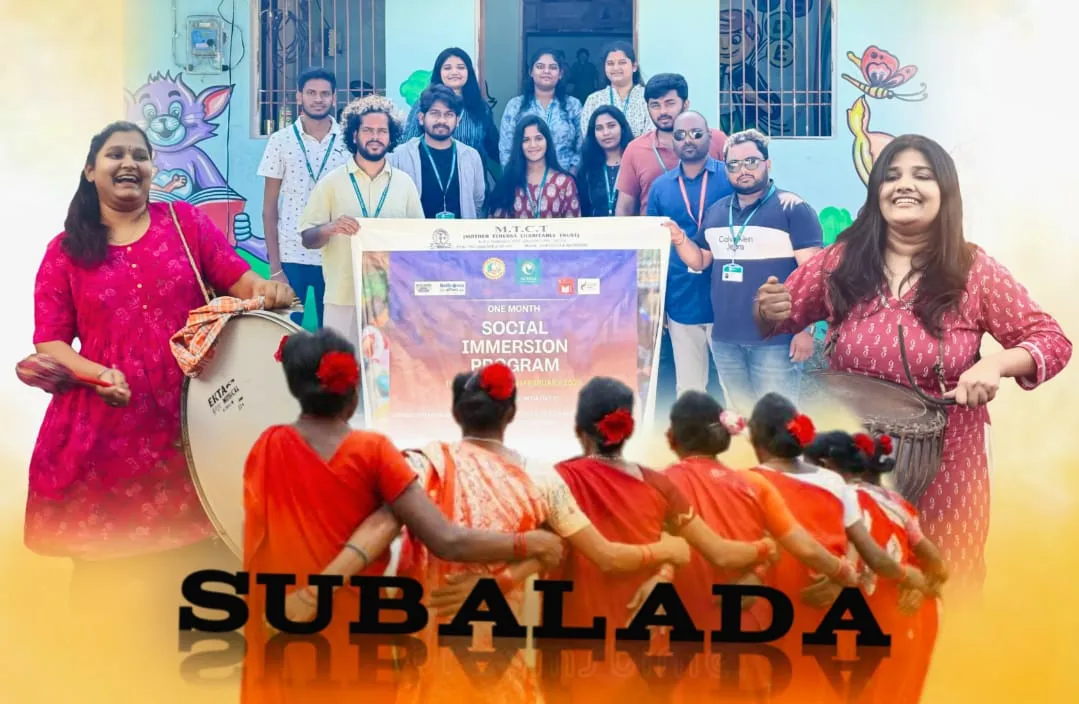
International Immersion section needs to be included with the following introduction: The International Immersion Program aims to provide students with a comprehensive understanding of global markets, cultures, and business practices while fostering awareness and sensitivity to cultural diversity and its influence on international business operations. Through hands-on experiences, such as visits to global corporations, industries, and institutions, the program equips students with practical insights into the global business landscape. It also focuses on enhancing leadership, adaptability, and critical thinking skills within a global context. Additionally, the program offers opportunities to build meaningful connections with international peers, leaders, and organizations, enabling students to develop a robust global network.
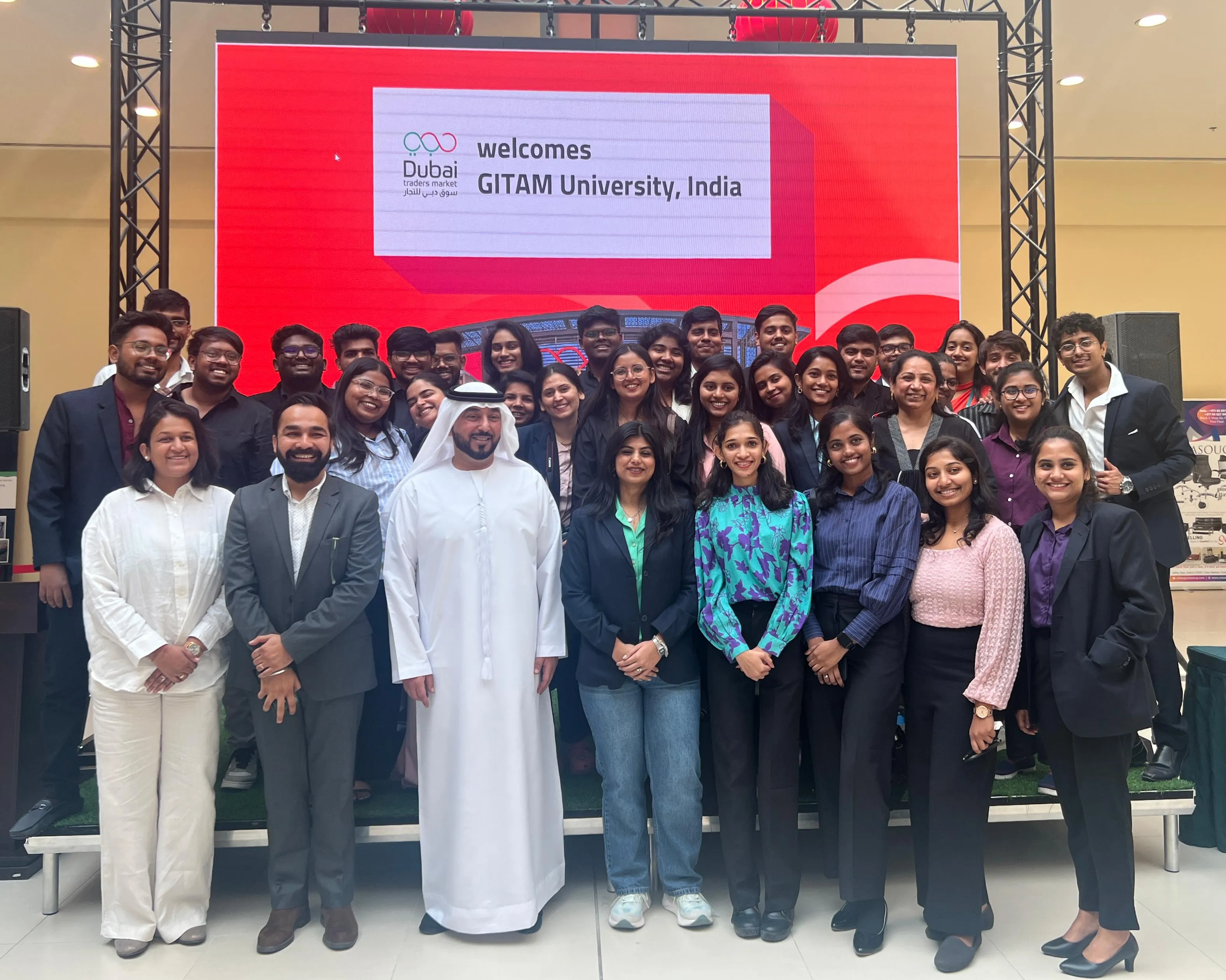
Infrastructure and Facilities
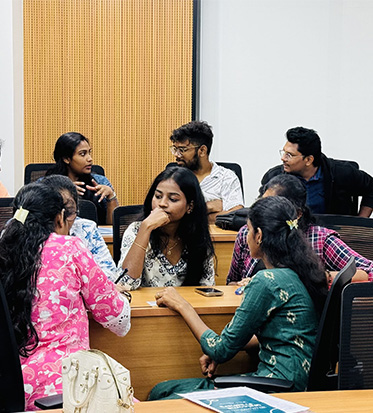
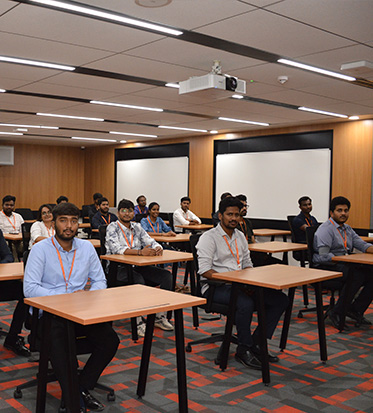
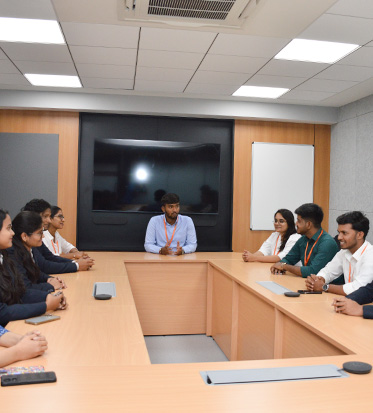

Fee Structure
Master of Business Administration
1st Year
₹5,33,800
2nd Year
₹5,47,800
Scholarships
Merit Scholarships upto 100%:
The scholarship from GAT/National/State Entrance Tests applies only in the first year. To continue receiving it in subsequent years, a minimum CGPA of 8.0 must be maintained.
Apart from the above, the following scholarships are also offered to eligible students.
- Employee Children Scholarships: (60%, 40%, and 20%)
- Loyalty Scholarships: (10% for Any alumni returning to do higher studies/Children of Alumni/Real siblings (Not applicable to step siblings or cousins)/Children of retired employees of GITAM/Spouse of GITAM employees).
- Sports Scholarships: (100%, 75%, 50%, 25% and 15%)
| Scholarship % | GBAT 2025 Aggregate Score | CAT / XAT / GMAT 2025 Percentile | MAT 2025 Percentile | NMAT 2025 Score | CMAT 2025 Percentile | SNAP 2025 Score | AP / TS ICET 2025 Ranks |
|---|---|---|---|---|---|---|---|
| 100% | 85-100 | 90-100 | 95-100 | >=270 | 95-100 | >=45 | 1 - 15 |
| 75% | 80-84.99 | 80-89 | 93-94.99 | 250 -269 | 93-94.99 | 40-44 | 16 - 30 |
| 60% | 75-79.99 | 75-79 | 90-92.99 | 234- 249 | 90-92.99 | 35-39 | 31 - 75 |
| 40% | 70-74.99 | 70-74 | 85-89.99 | 220 - 233 | 85-89.99 | 30-34 | 76 - 85 |
| 25% | 65-69.99 | 65-69 | 80-84.99 | 200 - 219 | 80-84.99 | 26-29 | 86 - 150 |
| 15% | 60-64.99 | 60-64 | 75-79.99 | 175 -199 | 75-79.99 | 23-25 | 151 - 500 |
Note: Terms & Conditions Applied
- GITAM Business Aptitude Test (GBAT) is mandatory if the candidate does not have any of the following scores: CAT/MAT/NMAT/CMAT/SNAP/AP/TG ICET.
- The above scholarships are subject to the candidate's interview performance, extempore, and academic consistency. The exact scholarship details will be provided in the Scholarship Award Letter cum Admit Letter.
- The scholarship from GAT/National/State Entrance Tests applies only in the first year. To continue receiving it in subsequent years, a minimum CGPA of 8.0 must be maintained.
Need-Based Scholarships
- To be eligible for the need-based scholarship, the combined income of both parents/guardians of the eligible student/If the student is married, the combined income of the family, i.e., the student's and spouse's income, must be less than 12.00 LPA.
- The candidates admitted through merit scholarship in the slabs of 75%, 60%, 40%, 25%,and 15%, and the parents/guardians combined income is less than the prescribed limits are eligible for the additional need-based scholarship.
| Scholarship % | Upgraded Scholarship % |
|---|---|
| 75% | 100% |
| 60% | 75% |
| 40% | 60% |
| 25% | 40% |
| 15% | 25% |
Scholarships For Accommodation
- In addition, students awarded need-based scholarships after merit scholarships will receive an additional 20% scholarship specifically allocated for hostel fees at GITAM for slabs: 15%, 25%, 40%, and 60%.
- Students awarded 75% & 100% scholarships are also awarded the same percentage in the hostel and food charges.






